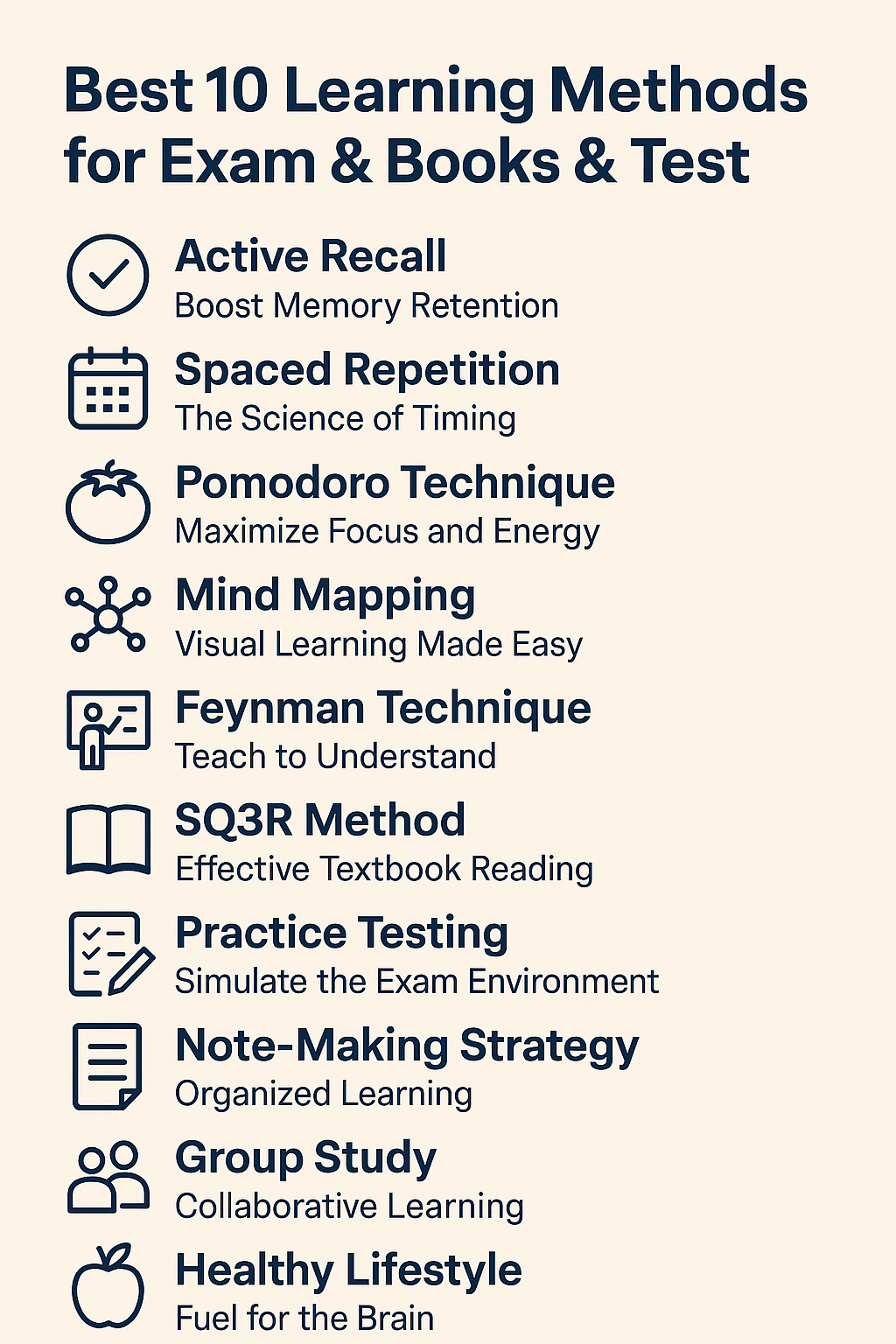Best 10 Learning Methods for Exams, Books & Tests

Success in exams doesn’t just depend on intelligence—it heavily relies on effective study techniques. With an overload of information from textbooks, guides, and online resources, it’s essential to adopt methods that boost retention, understanding, and exam performance. Below are the top 10 learning methods that can help you study smartly, retain better, and excel in both academic and competitive tests.
1. Active Recall – Boost Memory Retention

Active recall is one of the most powerful ways to study. Instead of passively re-reading textbooks or notes, test yourself on the material. Create flashcards, use apps like Anki, or quiz yourself from memory.
This technique forces your brain to retrieve information, strengthening neural pathways and improving long-term retention. It’s particularly effective when revising subjects like biology, history, and definitions-heavy topics.
2. Spaced Repetition – The Science of Timing

Spaced repetition is a scientifically proven learning strategy that involves reviewing information at increasing intervals. The goal is to review the material right before you are about to forget it.
Apps like Quizlet and Anki are excellent tools for automating this process. Spaced repetition helps you remember facts and formulas over the long term and is great for language learning and medical exam preparation.
3. Pomodoro Technique – Maximize Focus and Energy

The Pomodoro technique improves concentration by breaking study sessions into focused time blocks, usually 25 minutes, followed by a 5-minute break. After four sessions, take a longer 15–30-minute break.
This technique minimizes fatigue and keeps your brain sharp. It’s perfect for students who struggle with procrastination or have difficulty staying focused for long periods.
4. Mind Mapping – Visual Learning Made Easy

Mind maps are diagrams that visually organize information. You can use them to summarize chapters, draw connections between topics, or brainstorm ideas for essays.
This method is especially effective for visual learners and subjects like literature, business studies, and science where connections between concepts matter.
5. Feynman Technique – Teach to Understand

The Feynman Technique involves explaining a concept as if you’re teaching it to a child. If you can explain it in simple language, you truly understand it.
Try writing your explanation in a notebook or teaching a friend. This technique works wonders for understanding complex topics in math, physics, or economics.
6. SQ3R Method – Effective Textbook Reading

SQ3R stands for Survey, Question, Read, Recite, and Review. It’s a comprehensive method designed to help students read textbooks efficiently and retain what they read.
This method improves comprehension and retention, making it ideal for subjects with heavy reading like psychology, sociology, and history.
7. Practice Testing – Simulate the Exam Environment

Practice tests help you familiarize yourself with the exam format and timing. They also help reduce test anxiety and reveal weak areas.
Use previous year papers, online mock tests, and sample papers to simulate the real exam environment. This is crucial for exams like UPSC, IELTS, NEET, and JEE.
8. Note-Making Strategy – Organized Learning

Effective note-taking can drastically improve your ability to revise and retain concepts. Use methods like the Cornell Note-Taking System, bullet points, or color-coded notes.
Good notes reduce revision time and act as quick references during the final prep days
.
9. Group Study – Collaborative Learning

Studying in a group encourages idea sharing and allows you to understand diverse perspectives. You can quiz each other, solve problems together, and break down tough topics.
However, make sure your group is focused and small (ideally 3–5 members). Group study is best for brainstorming, clearing doubts, and reinforcing concepts.
10. Healthy Lifestyle – Fuel for the Brain

A healthy body supports a sharp mind. Sleep at least 7–8 hours, eat brain-boosting foods, stay hydrated, and exercise regularly. Avoid junk food, caffeine overload, and long all-nighters.
Bonus Tips for Exam Success
- Plan your timetable realistically and stick to it.
- Avoid cramming the night before exams.
- Use study apps like Notion, Evernote, and Trello to organize tasks.
- Stay positive and motivated – mindset is half the battle.
- Revise regularly rather than in one sitting.
Final Thought
Success in exams depends not on how much you study, but how effectively you study. Implementing techniques like active recall, spaced repetition, and the Pomodoro method, while also maintaining a healthy lifestyle, can dramatically enhance your preparation. Whether you’re preparing for school finals, university exams, or competitive tests, these top 10 learning methods will ensure that your hard work pays off.
Start today. Pick one or two methods, stay consistent, and keep improving. Success is just a smart study plan away.





